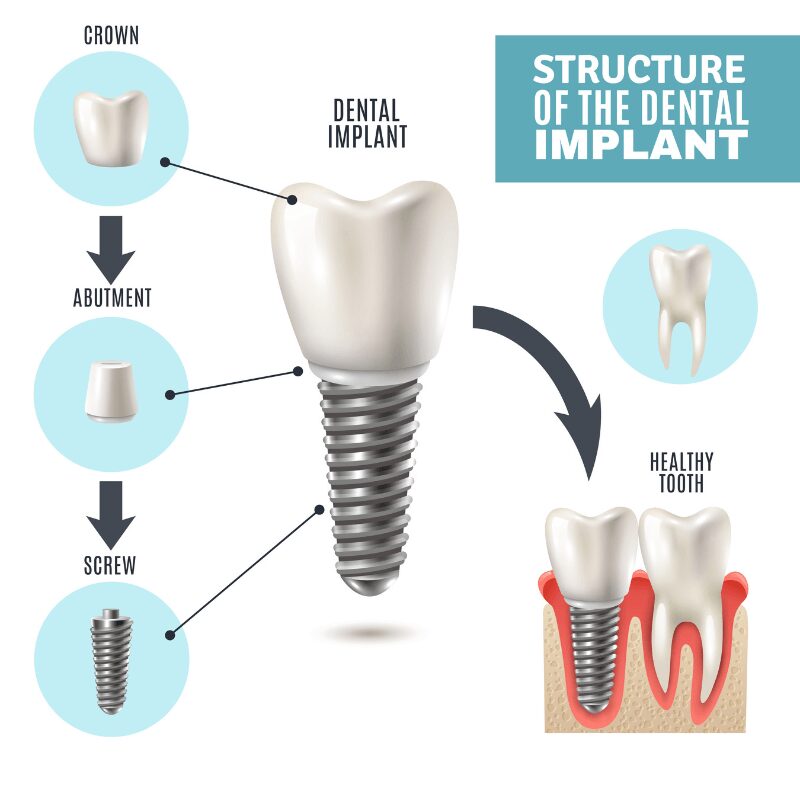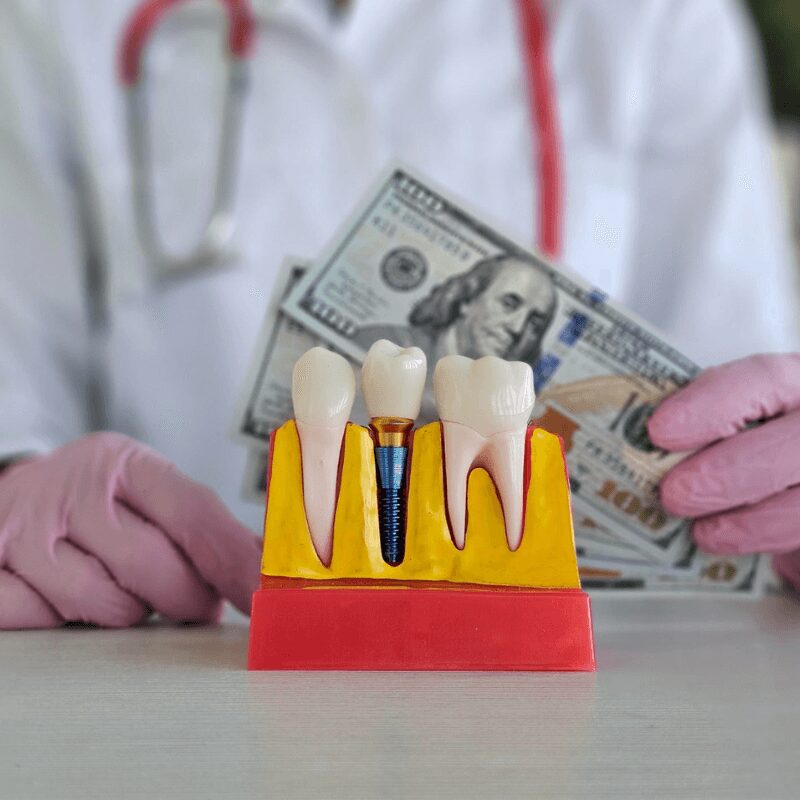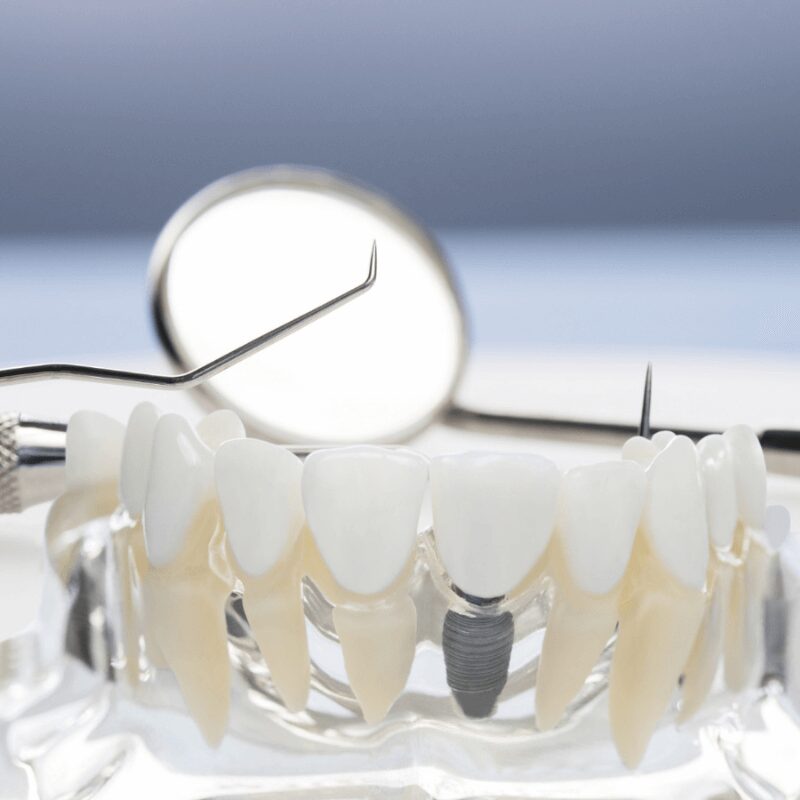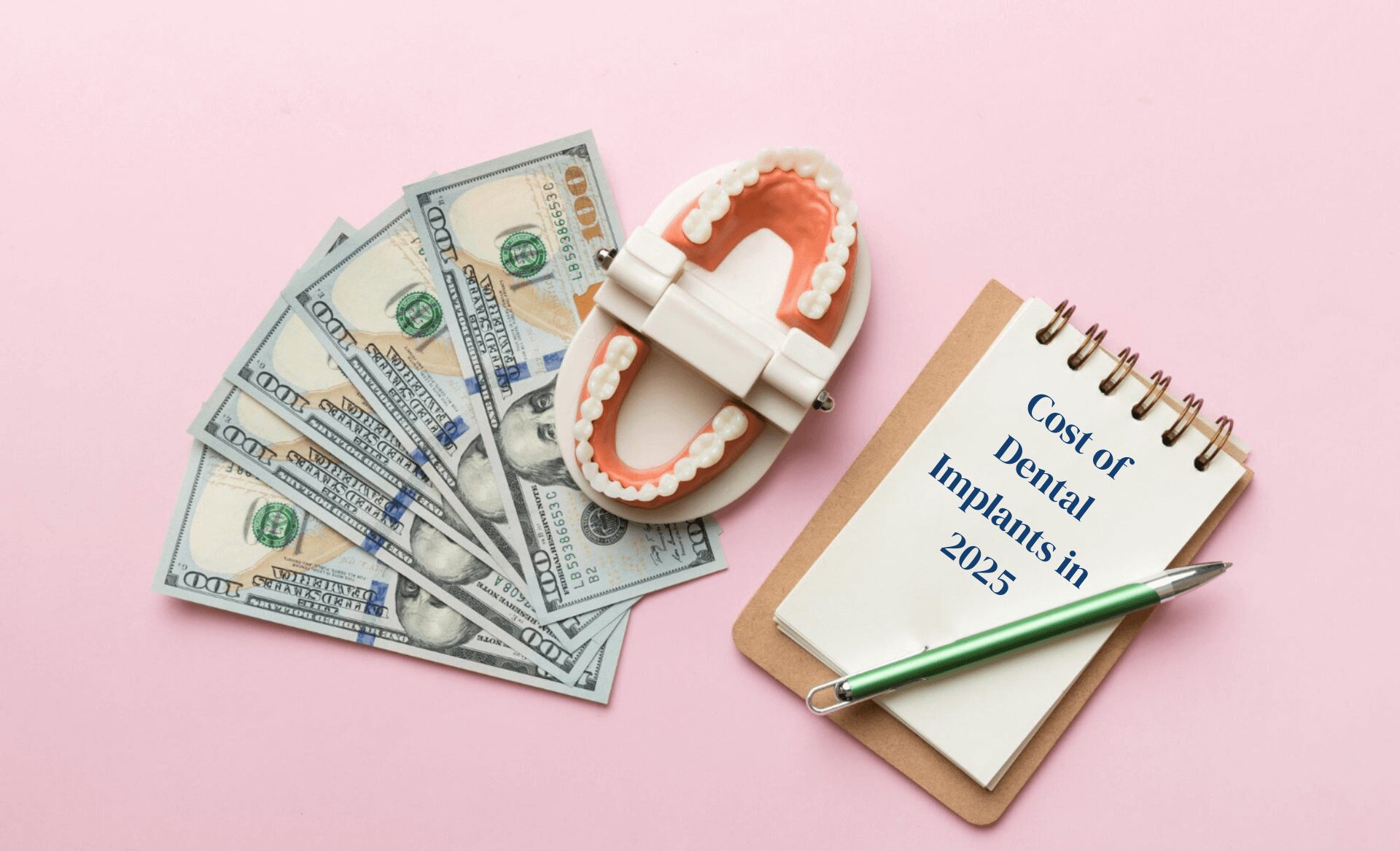Curious about how much dental implants cost? On average, single implants range from $1,000 to $3,000, with total costs climbing from $5,142 to $6,195. In this article, Advanced Indiana breaks down these expenses. It explores factors that impact the final price, offering you a clear understanding of the financial aspects regarding the cost of dental implants.
Key Takeaways
- Dental implant costs typically range from $1,000 to $3,000 per implant, with the overall procedure costing between $5,142 and $6,195. This is influenced by factors such as materials and additional procedures.
- The financial commitment for dental implants includes various stages such as initial consultations, extractions, abutments, crowns, and potential additional procedures like bone grafting, which can significantly impact total expenses.
- While dental implants may have higher initial costs, they offer durability, ease of maintenance, and better long-term value compared to dentures, making them a worthwhile investment in overall oral health.
Understanding Dental Implant Costs
The cost of dental implants can vary widely, typically ranging from $1,000 to $3,000 for the implant alone, while the overall procedure can cost anywhere from $5,142 to $6,195. This includes multiple stages, from the initial consultation to surgery and follow-up care, ensuring your new teeth are securely and comfortably in place. While this might seem like a hefty investment, consider the dental implants cost and the durability and aesthetic appeal that dental implants offer compared to alternatives like dentures or bridges.
Several factors influence the cost of dental implants. The number of implants needed, the type of materials used, and any additional procedures such as bone grafting all impact the final price. For instance, using titanium for its strength or zirconium for its aesthetic appeal can affect the cost. The expertise of the dentist and geographical location also affect the overall expense.

Though initially expensive, dental implants often turn out to be more cost-effective over time. Unlike dentures, which may require frequent replacements and adjustments, implants offer a permanent solution that can last a lifetime with proper care. This long-term investment can save you from recurring maintenance costs and provide you with a natural-looking, functional set of teeth.
Breakdown of Dental Implant Expenses
A breakdown of dental implant expenses can better prepare you for the financial commitment. The initial consultation typically includes a health assessment, 3D imaging, and a discussion of treatment options. This first step lays the groundwork for a successful dental implant procedures.
Tooth extraction costs, if needed, can range from $100 to $500 per tooth and are often included in the overall surgical costs, including tooth and root extraction. Once the extraction is complete, the next step is the placement of an abutment, which reinforces the dental implant after healing. The price for an abutment usually falls between $650 and $950.
The dental crown, the visible part of the implant, can cost between $1,100 and $2,000. Additional procedures like bone grafting may be necessary to ensure there is enough bone to support the implant. Bone grafting costs can range from $400 to $3,000, depending on the complexity of the procedure.
Combined with the cost of the implant device and surgical procedure, only the cost of all the expenses and total costs provide a comprehensive financial view.
Single Tooth Implant Cost

The cost of a single tooth implant can range from $3,500 to $6,700, covering both the implant device and surgical procedure. While the average cost is typically between $3,000 to $6,000, some cases can be as low as $1,500 to $2,300.
The complexity of the procedure and the need for additional treatments can significantly affect the price, which can vary greatly depending on the specifics. For instance, if bone grafting is required to provide a stable foundation for the bone graft implant, this can increase the overall cost.
However, investing in a single tooth implant can offer a durable and aesthetically pleasing solution for replacing one or more teeth, including tooth implants.
Multiple Implant Cost
Replacing multiple teeth often involves solutions like implant-supported bridges and All-on-4 implants. The cost for implant-supported bridges can vary widely, ranging from $3,250 to $30,000, depending on the number of implants and the complexity of the case. These solutions provide better stability and aesthetics compared to traditional dentures and help preserve jawbone health.
Implant-supported dentures provide a stable and comfortable fit for those who have lost most or all of their natural teeth, unlike traditional dentures. A full mouth of replacement teeth costs at least $60,000, a significant investment offering long-term benefits.
Patients with insufficient bone density can still be candidates for All-on-4 implants, which do not require bone grafting and provide a stable and aesthetically pleasing solution. The costs for multiple implants will vary depending on how many implants are needed and the specific needs of the patient, but they generally provide a more stable and functional solution compared to traditional dentures.

Additional Costs to Consider
Beyond the primary costs, additional expenses can impact the overall price of dental implants. Procedures like bone grafting or sinus lifts can substantially increase the total cost of dental implants. These procedures are often necessary to ensure there is enough bone to support the implant and can range from $400 to $3,000.
Anesthesia options also vary in cost. Depending on whether local, sedation, or general anesthesia is used, this can add another layer of expense to the overall procedure. Discussing these options with your oral surgeon helps you fully understand the costs involved.
Follow-up office visits after the implant procedure are crucial for monitoring healing and ensuring proper implant function. These visits may incur additional costs if not covered by insurance, so factor them into your overall budget.
Factors Affecting Dental Implant Costs
Several factors can significantly affect the cost of tooth implants. Geographic location plays a major role, as areas with a higher cost of living typically have higher dental implant costs. Additionally, the materials used for the implants, such as titanium for strength or zirconium for aesthetics, can also impact the price.

Individual dental health needs and procedure complexity can lead to unexpected costs. Significant bone loss may necessitate additional procedures like bone grafting. Diagnostic tools like X-rays and CT scans are necessary to assess jawbone quality before implant placement and can add to the overall cost.
It’s important to remember that the cost of teeth implants varies for each individual. Each person’s dental health needs are unique, ultimately determining the final expense.
Insurance Coverage for Dental Implants
Insurance coverage for dental implants can vary widely. Some dental insurance plans may cover a portion of the cost, while others may not offer any coverage at all. It’s essential to check your individual dental insurance providers cover to understand what dental insurance coverage is covered and what out-of-pocket costs you may incur.
Maximizing your insurance benefits often involves utilizing in-network providers, which can lead to better reimbursements. It’s also advisable to verify if your plan covers specific types of implants or procedures related to them, as some plans may have exclusions or require a waiting period before benefits apply.
If covered, insurance may only apply to specific aspects like the surgical placement or the crown. Knowing the extent of your coverage aids in financial planning for additional expenses.
Affordable Dental Implant Options
Several affordable options exist for those worried about the cost of dental implants. Many dental practices offer patient financing options such as payment plans, healthcare credit cards, and personal loans to help manage the costs. Institutions like Penn Dental offer care credit financing for qualifying patients, making affordable dental implants more accessible. Additionally, patient financing can provide further assistance in covering these expenses.
Implant-supported dentures could be a more affordable solution for individuals unable to afford multiple dental implants through affordable monthly installments. These dentures offer the stability and functionality of implants at a lower cost.
Additionally, zygomatic implants are an alternative that does not require bone grafting, which can further reduce the overall expense. Exploring and discussing these options with your dental professional can help provide zygomatic implants as a cost-effective solution that meets your needs without compromising quality.
Benefits vs. Costs of Dental Implants
Though initially more expensive, the long-term benefits of dental implants often outweigh the costs. Dental implants significantly enhance mouth functionality and prevent jawbone deterioration, thereby maintaining facial structure and appearance over time. They are a valuable investment in your overall health and well-being.
The durability of dental implants often surpasses that of fixed prostheses or dentures, lasting nearly a lifetime with proper care. Dental implants offer a more convenient maintenance routine compared to dentures that need regular removal for cleaning. Delaying dental implant treatment can lead to further oral health issues, potentially increasing overall expenses later.
Prioritizing quality materials and dentist expertise can ensure long-term satisfaction despite higher initial costs. Investing in dental implants can save you from recurring maintenance costs and provide a more stable and functional solution for missing teeth and existing teeth.
How to Choose the Right Dental Implantologist
Selecting the right implantologist is crucial for a successful dental implant procedure. Assessing the experience and qualifications of potential providers is crucial. During consultations, don’t hesitate to ask about their experience with implant procedures and how they handle complications. Opting for a provider who is a member of reputable organizations, like the American Academy of Implant Dentistry, ensures adherence to high standards. Our implant team is dedicated to providing exceptional care.
Location is another key factor; selecting a provider close to your home or workplace can facilitate frequent visits during the treatment process. Reading reviews and testimonials from previous patients can provide valuable insight into the quality of care offered. Inquiring about the types of technology used can also enhance the quality of care and treatment outcomes.
Summary
Understanding the costs and benefits of dental implants is crucial for making an informed decision. Dental implants offer a durable, aesthetically pleasing, and functional solution for missing teeth, despite the higher initial costs. By considering factors like additional procedures, insurance coverage, and financing options, you can better prepare for the financial investment.
Choosing the right implantologist and prioritizing quality can ensure long-term satisfaction and health benefits. Dental implants installed by implantologists at Advanced Indiana not only enhance your oral functionality but also preserve your jawbone and facial structure, making them a valuable investment in your overall well-being.
So, if you’re thinking about getting an implant to replace your broken or missing teeth, contact Advanced Indiana to set up an appointment with your local implantologist in Anderson, Fortville, and Indianapolis. For more information on implant-supported options, explore the types and appropriate ages for dentures.
Frequently Asked Questions
To choose the right dental professional for your implants, evaluate their experience and qualifications, read client reviews, and consider their location and the technology they utilize. This approach ensures you receive quality care tailored to your needs.
Yes, there are affordable options for tooth implants, including financing plans, healthcare credit cards, and implant-supported dentures that can help manage costs effectively.
It is essential to consider additional costs such as:
- Bone grafting
- Anesthesia
- Follow-up visits
Because these can significantly affect the total expense of dental implants, planning for these potential costs will help you manage your budget effectively.
Dental insurance providers may or may not cover implants, with some plans providing partial coverage while others may not cover them at all. It is essential to check with your specific insurance provider for detailed information regarding your coverage.
A single dental implant typically costs between $3,500 and $6,700, influenced by the procedure’s complexity and any additional treatments required.

